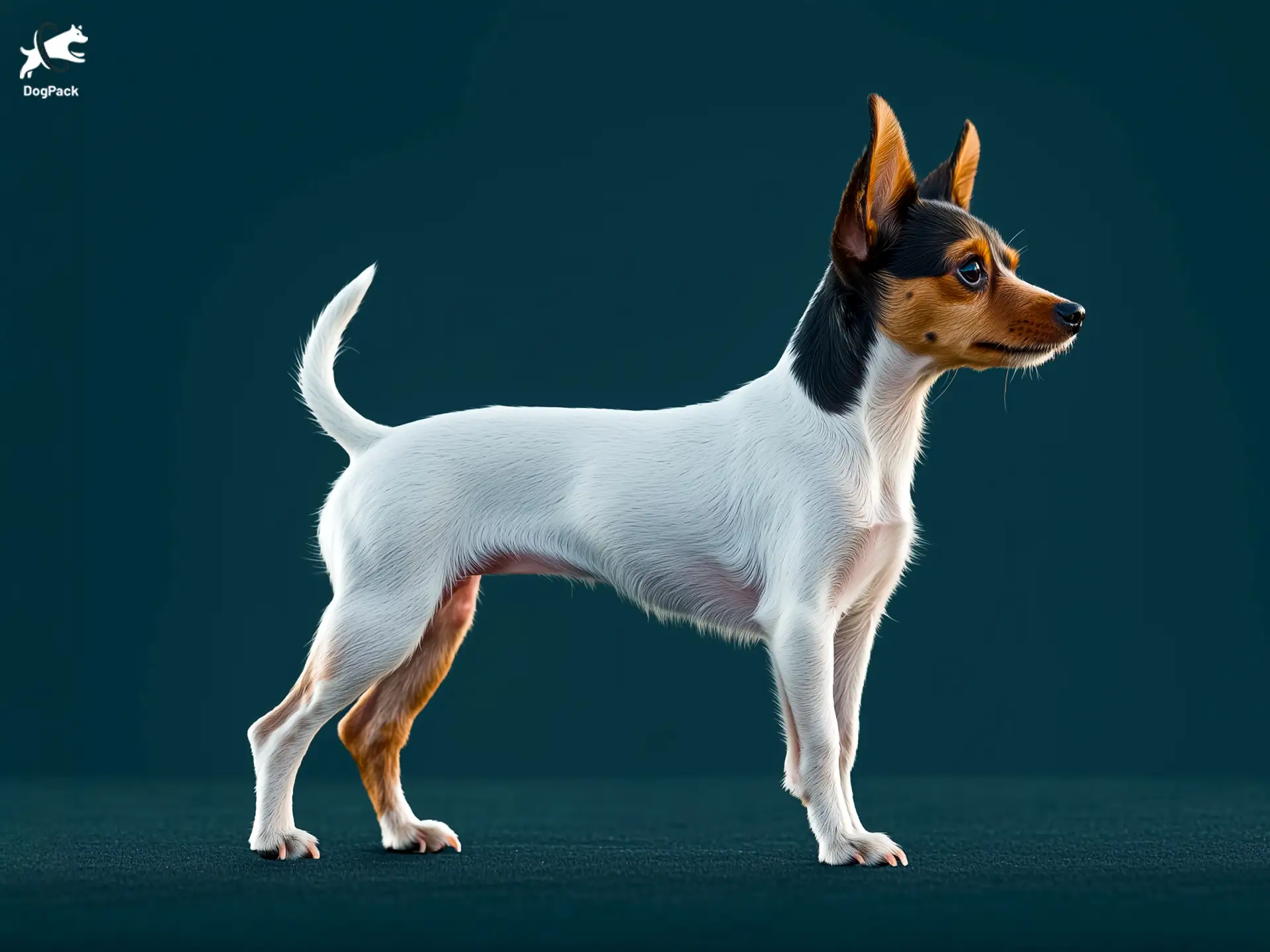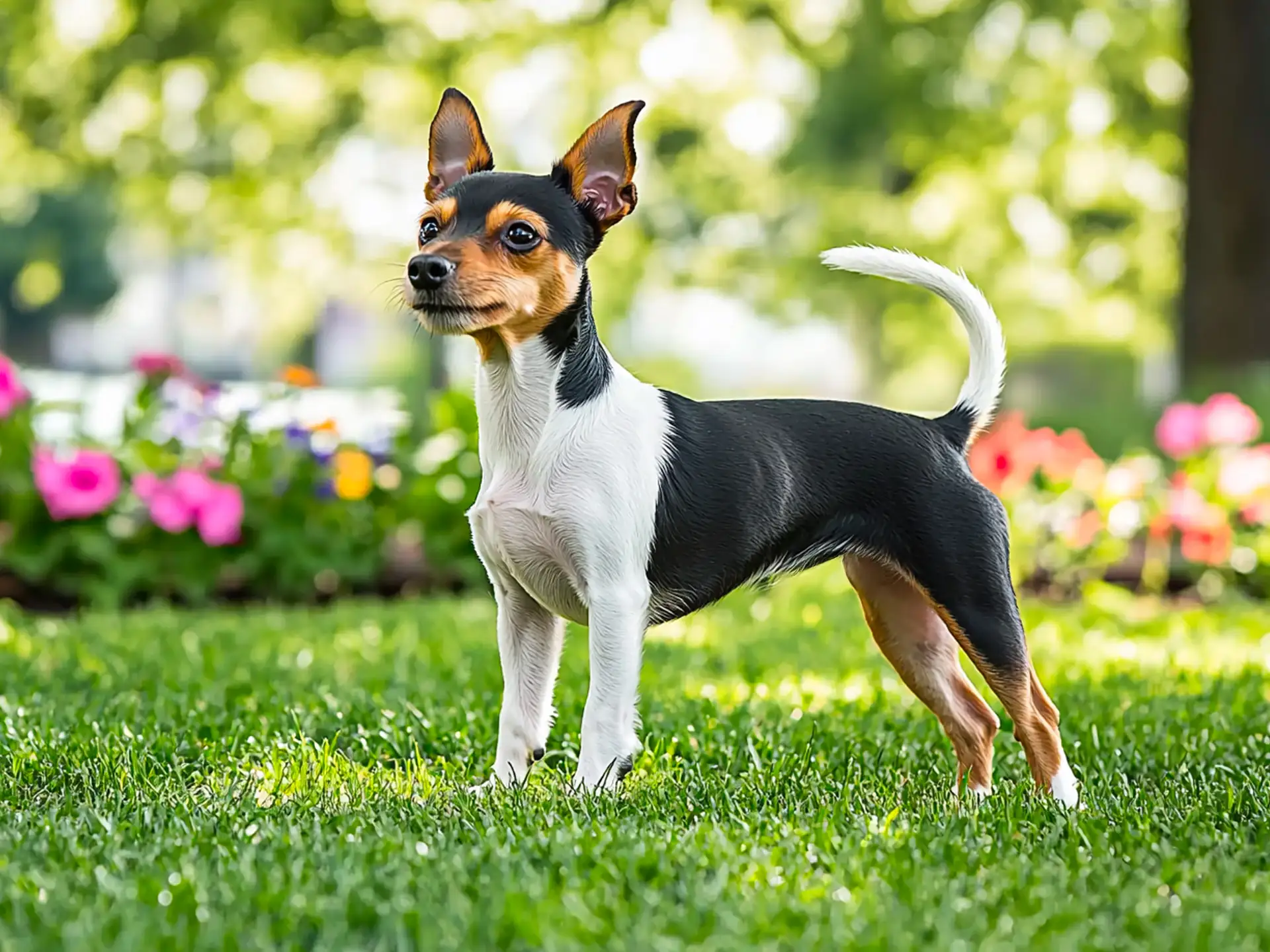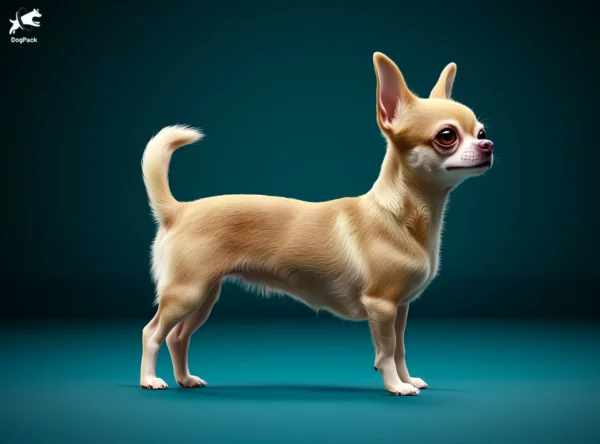Toy Fox Terrier Dog Breed Info & Overview
Tiny, fearless, and bursting with personality, the Toy Fox Terrier brings big-dog boldness wrapped in a petite package. Originally bred in the United States, this active companion loves to be the center of attention. With their playful nature and sharp intelligence, these charmers keep their families laughing while remaining devoted, snuggly lapdogs at heart.
Characteristics
Pictures
Breed History
The Toy Fox Terrier originated in the early 20th century, developed by crossing small Smooth Fox Terriers with various toy breeds like Chihuahuas and Manchester Terriers. The goal was to create a fearless yet pint-sized ratter, perfect for catching pests around barns. Though tiny, these dogs proved fiercely determined, taking on tasks that seemed far bigger than their modest stature.
The American Kennel Club recognized the breed in 2003, but these terriers had been charming audiences long before that. Some found their way into traveling circuses, showcasing their agility and intelligence by performing tricks in front of amazed crowds. Over time, their quick wit, loyalty, and eye-catching looks made them favorites not only in the ring but also at home.
As word spread about their talents, more families sought these little dynamos to guard the pantry from rodents or simply add excitement to daily life. Tales of them fearlessly confronting bigger barnyard foes became legendary with unwavering gusto. Today, they carry on that same unwavering spirit, bridging the gap between working ratter and beloved companion in countless American households.
Temperament, Personality
Bursting with a zest for life, these tiny terriers aren’t shy about making their presence known. Picture an enthusiastic performer always ready for the next act—whether it’s an impromptu game of chase or cuddling up on the couch. Confident and self-assured, they rarely back down from a challenge, even if it means confronting a vacuum cleaner twice their size.
Although they relish being the center of attention, they’re adept at coexisting with kids, especially those who respect their space and playful nature. Early socialization helps them adapt to feline roommates or larger canine siblings, but they might still boss everyone around. Their quick intelligence means they thrive on interactive games, puzzle toys, and mental challenges that showcase their clever side.
Expect a watchful nature around strangers; they’ll alert you to every unfamiliar sound with a decisive bark. While not typically aggressive, they can be guarded at first, warming up once they sense friendly intentions. The Toy Fox Terrier craves companionship, so leaving them alone for extended periods might lead to boredom—and the inevitable mischief that follows.
Physical Characteristics
Lightweight yet sturdily built, the Toy Fox Terrier has a classic terrier outline—straight back, well-defined chest, and a perky posture that oozes confidence. The head is wedge-shaped, topped with erect, V-shaped ears that give them a constantly alert appearance. Their dark, sparkling eyes hold a mischievous gleam, hinting at their zesty personality hidden beneath that small stature.
The coat is short, satiny, and smooth, often featuring a predominantly white body with distinct markings in black, tan, or chocolate. Because of their single-layer coat, these dogs are less tolerant of colder climates. Watch them closely in chilly weather: Cozy dog sweaters and blankets can help them stay comfortable. Despite the petite frame, they move with a sprightly confidence that draws admiring looks.
Their compact form makes them an ideal choice for those who crave a big spirit in a small package. They adapt easily to apartment living, yet they excel in agility sports and playful backyard romps. The Toy Fox Terrier may look fragile, but they’re surprisingly sturdy—just remember that their energetic nature demands at least moderate daily activity to maintain muscle tone and overall health.
Health Issues
While generally robust, these terriers can be prone to certain health conditions. One relatively common issue is patellar luxation, where the knee cap slips out of place. Watch for any lameness or hopping motions that could indicate knee troubles. Early detection and, if necessary, surgical intervention can help preserve mobility and comfort as they age.
Some Toy Fox Terriers can develop Legg-Calvé-Perthes disease, a condition affecting the hip joint. Symptoms include limping, difficulty in movement, or reluctance to bear weight on one leg. Regular vet checkups and X-rays, if recommended, can catch this concern before it worsens. Maintaining a healthy weight also reduces strain on their tiny frames and joints.
Dental health is another priority, given the breed’s petite jaws. Plaque buildup occurs quickly, leading to gum disease or tooth loss if not addressed. Regular brushing, professional dental cleanings, and a vet-approved chew regimen can help keep their teeth shiny. As with most purebred dogs, annual vet visits, vaccinations, and parasite prevention ensure these spirited companions stay in tip-top shape.
Grooming Needs
Grooming a Toy Fox Terrier is delightfully low-fuss. Their smooth coat requires only a quick weekly brush with a soft bristle or rubber curry brush to remove any loose hairs. Thanks to minimal shedding, you won’t find too many stray “hair tumbleweeds” rolling around your home. A gentle rub-down will also help distribute natural oils, keeping the coat glossy.
Because these pups can be sensitive to cold, many owners opt for dog sweaters during cooler months. Beyond that, bath time is straightforward: once a month or when they get into something messy. Use a mild dog shampoo to avoid irritating their skin. Always towel them dry thoroughly and ensure they aren’t exposed to drafts afterward.
Nail trimming should be done regularly—every two to three weeks—to keep paws comfy and to prevent snagging. Monitor their ears for wax build-up or signs of infection, gently cleaning them with a vet-approved solution. Don’t forget daily dental care. Brushing your dog’s teeth can significantly reduce tartar buildup and gum problems, keeping your Toy Fox Terrier’s grin bright and healthy.
Exercise Requirements
Don’t let their size fool you—these lively dogs have plenty of energy to burn. A brisk walk around the neighborhood or a spirited indoor play session can keep them satisfied. Tug-of-war, fetch, or puzzle toys help channel that natural curiosity. Short bursts of high-intensity activity go a long way in preventing restlessness, and a tired terrier is typically a well-behaved terrier.
If you have a safe, fenced yard, set aside daily time to let them zoom around and explore. They also excel in canine sports like agility or obedience competitions, tapping into their sharp minds and nimble bodies. Just remember to respect their small stature—avoid rough games or high jumps that could stress their joints. Consistency is key: aim for at least 30 minutes of activity each day.
In an apartment setting, structured exercise is crucial so they don’t bounce off the walls. Small dog breeds like this can adapt well to indoor life if given opportunities to release pent-up energy. Interactive toys and brief training sessions throughout the day can fill their mental “workout” quota. If you notice them getting bored or vocal, it’s likely time for another quick play session.
Training Tips
Training a Toy Fox Terrier can feel like a game of wits. They’re eager to please but also cunning enough to push boundaries. Positive reinforcement—think treats, praise, or a favorite squeaky toy—goes a long way in reinforcing good behavior. Harsh methods are a no-go, as these sensitive pups may become timid or defiant. Consistency and patience are the secret ingredients to successful teaching.
Begin socializing your dog from puppyhood: Introduce them to different sounds, people, and environments to prevent skittishness. Short, frequent training sessions harness their alert, inquisitive nature. Commands like “sit,” “stay,” and “come” become second nature when taught with fun games and tasty rewards. Never underestimate the value of a well-timed treat—this breed is famously food-motivated.
Housebreaking can be a challenge with some terriers, so setting a strict schedule helps. Take them outside on a regular basis and praise them generously for doing their business in the right spot. Crate training also gives these dogs a safe, cozy den to call their own. Overall, an enthusiastic yet structured training approach works wonders on this breed’s bright, sometimes cheeky mind.
Nutrition, Diet
Given the Toy Fox Terrier’s high energy and petite size, they require a nutrient-dense diet formulated for small-breed dogs. Look for high-quality kibble with balanced protein, fats, and essential vitamins. Opt for brands that list real meat as the first ingredient—chicken, turkey, or fish can all be excellent options. Avoid generic “by-product meals” or fillers that offer little nutritional value.
Portion control is critical. Most healthy adults do well on roughly ¼ to ½ cup of premium small-breed kibble per day, split into two meals. Adjust based on activity level: if your dog is constantly on the go, they may need the higher end of that range. Keep an eye on treats—though these pups love snacks, overindulgence can quickly lead to unwanted weight gain.
Some owners add occasional wet food or fresh meat toppers to entice picky eaters. However, any diet change should be gradual to avoid digestive upsets. A fish oil supplement can support joint health, especially beneficial for dogs prone to patellar or hip issues. When in doubt, consult your veterinarian for a tailored feeding plan that meets your Toy Fox Terrier’s individual needs and lifestyle.
Adoption, Breeders
If you’re considering a Toy Fox Terrier, start by researching shelters or breed-specific rescues. Sometimes, retired show dogs or adult dogs in need of rehoming pop up, offering a calmer transition than raising a puppy. Check sites like Adopt-a-Pet or Petfinder to find a local match. You might just rescue a hidden gem ready to flourish in your loving home.
For those set on a puppy, seek out ethical breeders committed to health screenings. Reputable breeders will often conduct genetic tests for common issues like patellar luxation or Legg-Calvé-Perthes disease. They’ll also provide documentation, vet records, and valuable socialization tips. Stay clear of quick-sales or suspiciously low-priced puppies—these red flags may point to mills or disreputable practices.
The American Toy Fox Terrier Club maintains a list of trusted kennels. Visit prospective breeders in person, if possible, to see the puppies’ environment and meet the mother dog. Ask about the puppy’s diet, vaccination schedule, and personality traits. A caring breeder guides you long after the sale, ensuring a smooth transition for both you and your newest family member.
Family Pet?
Though small, these terriers have hearts big enough to love an entire family. They bond closely with owners, following them around to stay in the loop. Kids who understand how to handle tiny dogs will often find an enthusiastic playmate. Still, because of their size, boisterous play sessions with toddlers should be supervised to avoid accidental knocks or injuries.
Their sharp intelligence makes them attuned to family dynamics; they’ll quickly figure out who’s most likely to hand out treats or cuddles. In many cases, they thrive in multi-pet households, especially with dogs that match their energy. Cats can be trickier, given the TFT’s terrier instincts. Early introductions set the stage for peaceful coexistence—just be mindful of any chasing tendencies.
If you’re seeking a pint-sized companion that’ll run circles around you one minute and curl up on your lap the next, you’ll adore life with a Toy Fox Terrier. They offer comedic relief, unwavering devotion, and a surprisingly protective streak. That said, their spirited temperament isn’t for everyone. Families who enjoy interactive play, daily walks, and constant companionship are the best fit.
Right For You?
This breed’s readiness to befriend you at every turn is part of its charm. But if you’re frequently out of the house, consider whether a high-energy dog might grow lonely or bored. A Toy Fox Terrier craves mental stimulation and human interaction. For work-from-home individuals or retirees with time to share, these dogs can be a delightful, energetic addition.
Apartment dwellers appreciate this breed’s small size and manageable exercise needs, yet prospective owners should brace themselves for occasional barking. A quick heads-up: Toy Fox Terriers aren’t shy about voicing opinions, whether it’s a squirrel outside or an unfamiliar footstep in the hallway. With proper training and attention, though, it’s a quirk that can be managed.
If you dream of a loyal sidekick that doubles as a mini-entertainer, you’ll find what you’re looking for here. Those ready to provide structure, regular exercise, and mental challenges will be rewarded with a bright-eyed companion who adores life by your side. On the flip side, if you prefer low-energy or aloof pets, you might consider a more laid-back breed.
Conclusion
Warm, witty, and always up for fun, the Toy Fox Terrier can be the ideal furry friend for owners who value spirited companionship in a compact frame. Their intelligence and zest for life mean you’ll never lack entertainment—just be prepared to offer daily exercise and plenty of bonding time. If you’re up for an energetic, loyal sidekick, this breed could be your perfect match.
FAQs
-
Why do Toy Fox Terriers have such a strong prey drive despite their small size?
Toy Fox Terriers were bred from larger hunting fox terriers, retaining their strong prey instincts. They excel at catching rodents and small pests, making them surprisingly effective hunters despite being a toy-sized breed.
-
Do Toy Fox Terriers develop unique sleeping habits?
Yes, many Toy Fox Terriers love burrowing under blankets or snuggling in warm spots. This behavior comes from their need for warmth and security, a trait commonly seen in small companion breeds that seek cozy resting places.
-
Why do Toy Fox Terriers often stand on their hind legs?
Toy Fox Terriers are known for their circus-like agility and love to balance on their hind legs to beg, play, or get attention. Their compact build and strong back legs make this a natural and frequent behavior.
-
Are Toy Fox Terriers known for unusual vocalizations?
Unlike many small breeds, Toy Fox Terriers don’t just bark—they “talk.” They often make expressive sounds, from grumbles to excited yips, and many owners say their dogs develop a unique way of communicating their moods.
-
Why do Toy Fox Terriers love to carry small objects around?
Toy Fox Terriers enjoy carrying small toys, socks, or even food bowls. This stems from their terrier instincts, where they instinctively carry and stash items, mimicking the way their ancestors handled prey.
Breed Ratings
The Toy Fox Terrier quickly masters new commands and thrives on challenging tricks.
Expect endless games of fetch, tug, and chase. They love to entertain and be entertained.
Daily exercise is essential to channel this little dynamo’s zest for life.
Minimal shedding thanks to a short, single-layer coat—quick brushes keep hair at bay.
Terrier instincts are strong, but early socialization helps them coexist with smaller pets.
Simple coat care, though nails and ears need consistent attention.
Smart but sometimes stubborn—positive reinforcement works wonders.
They prefer company; isolation can lead to boredom and barking.
Quick to alert owners, but training can reduce unnecessary noise.
Very little drool, if any, so they’re generally tidy around the house.
Fairly social if introduced properly, but can be territorial with unfamiliar dogs.
Generally healthy, but watch for knee and hip issues in these lively pups.















